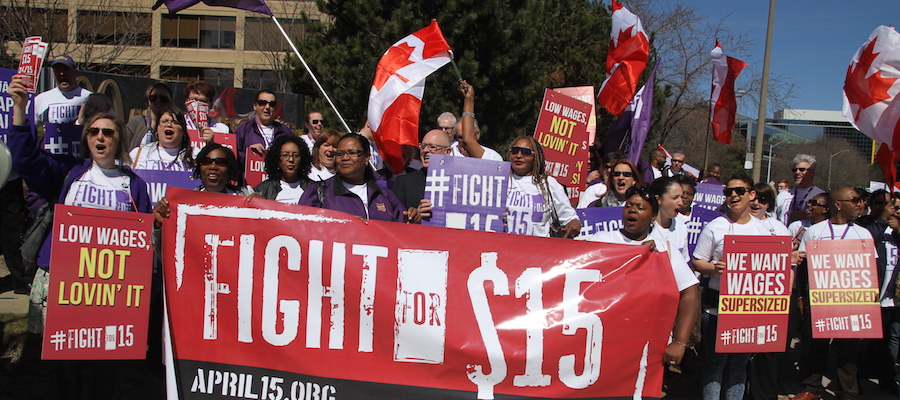Employment rights justice denied to thousands of BC Workers

For decades, the BC Employment Standards Branch has not effectively enforced the Employment Standards Act, meaning thousands of workers are denied their legal rights, a new report that we co-wrote with the BC Employment Standards Coalition shows.
Complaints take between 18 months to three years to resolve; the Branch doesn’t proactively investigate employers, industries and sectors with a history of violations, particularly in the gig economy; and staffing and budgets are inadequate to enforce the Act are some of our findings.
The Employment Standards Act outlines the minimum standards of employment that most BC workers are entitled to. It sets out employment conditions like minimum wage, minimum and maximum hours of work, overtime pay, parental leave, paid sick leave, vacations with pay and statutory holidays with pay.
Our report, Justice Denied: The Systemic Failure to Enforce BC Employment Standards, exposes some of the most serious failures of the Branch to effectively, efficiently and fairly enforce the Act. These failures result in thousands of workers being denied their employment rights, in particular the timely recovery of unpaid wages due to employer wage theft.
Employer wage theft is when employers do not pay their employees the wage rates and wage-related benefits that are mandated by law or contracts of employment.
Our report shows Branch failures that include:
- inaccessible offices, inconvenient hours of operation and a lack of informed procedural advice that can be barriers to employees having their complaints addressed.
- poor communication with complainants and their advocates or advising complainants to withdraw legitimate complaints without conducting proper investigations.
- clearly favouring employers in practices and procedures.
- procedural unfairness in investigating and adjudicating complaints. These include claimants being denied oral hearings in cases involving disputed facts, complex issues and evidence, or where there is a need for Branch staff to test evidence or decide credibility issues.
Once elected in 2001, the BC Liberal government cut the Employment Standards Branch budget by 57 per cent over the next 10 years, closed eight regional offices, reduced enforcement staff by 51 per cent and created significant administrative barriers to the filing of complaints. Proactive investigations were terminated and employee complaints declined dramatically, something that hasn’t changed substantially since the NDP was elected in 2017. Thousands of workers have been denied their employment rights, in particular the timely recovery of unpaid wages due to employer wage theft.
In its most recent service plan, Ministry of Labour objectives include creating and enforcing “strong and fair labour laws and standards that respond to the rise of the gig economy and increased precarious work, update and modernize BC Labour Laws, ensure that labour laws are communicated and enforced through effective, client-centered service delivery, prioritize the processing of complaint files to improve service delivery for workers and employers.”
However, our Justice Denied report demonstrates the ministry has failed to act on these objectives and the Director of Employment Standards is not able to carry out their statutory mandate to ensure all employees receive the minimum employment standards to which they are entitled. The report explains that the director needs the resources and ministry direction to undertake a comprehensive program of proactive workplace investigation as the BC Law Institute recommended in a 2018 review of the Branch.
In the Justice Denied report, the BC Employment Standards Coalition estimates the Branch budget needs to be doubled to effectively and efficiently carry out its mandate and achieve its stated objectives. This is the first step towards addressing the enforcement crisis of employment standards in BC. Incredibly, the provincial government’s 2022/23 budget does not include an increase in the Ministry of Labour budget for the next three years, which signals a growing enforcement crisis for the foreseeable future that will continue to harm workers.
 This article is part of Understanding Precarity in BC (UP-BC), a research and public engagement initiative investigating precarious work and multi-dimensional precarity in British Columbia. UP-BC is jointly led by Simon Fraser University’s Morgan Centre for Labour Research and the Canadian Centre for Policy Alternatives BC Office, and brings together four BC universities, 26 community-based organizations and more than 80 academic and community researchers and collaborators. The partnership is supported by the Social Science and Humanities Research Council of Canada (SSHRC). For more information about UP-BC visit understandingprecarity.ca.
This article is part of Understanding Precarity in BC (UP-BC), a research and public engagement initiative investigating precarious work and multi-dimensional precarity in British Columbia. UP-BC is jointly led by Simon Fraser University’s Morgan Centre for Labour Research and the Canadian Centre for Policy Alternatives BC Office, and brings together four BC universities, 26 community-based organizations and more than 80 academic and community researchers and collaborators. The partnership is supported by the Social Science and Humanities Research Council of Canada (SSHRC). For more information about UP-BC visit understandingprecarity.ca.
Topics: Employment & labour, UP–BC


